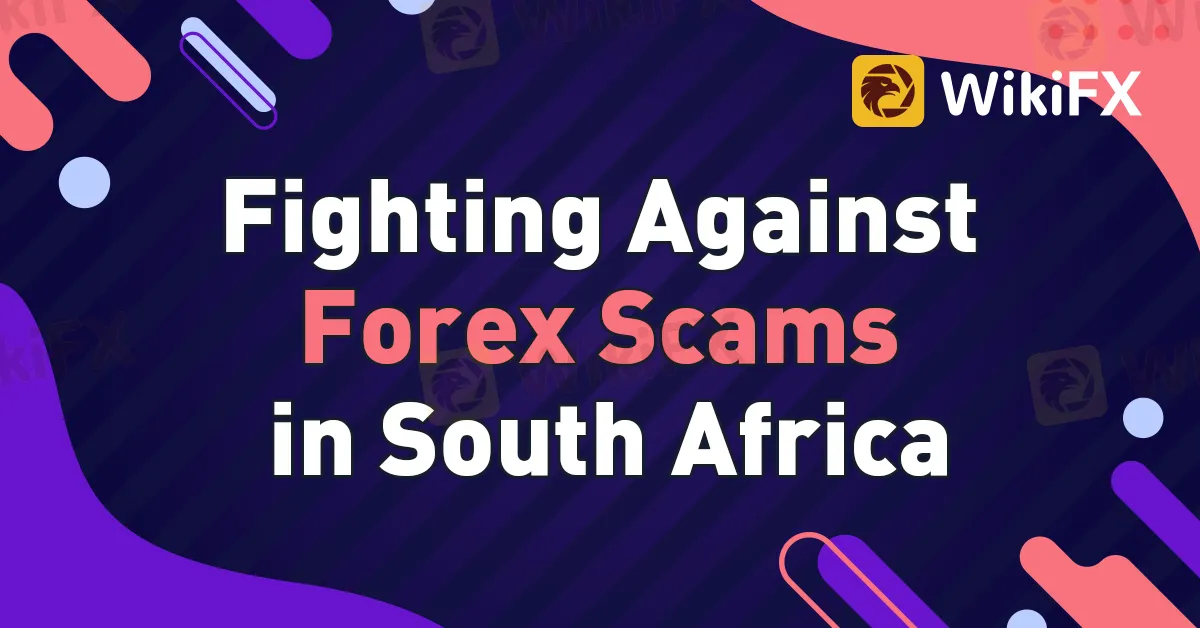简体中文
繁體中文
English
Pусский
日本語
ภาษาไทย
Tiếng Việt
Bahasa Indonesia
Español
हिन्दी
Filippiiniläinen
Français
Deutsch
Português
Türkçe
한국어
العربية
Fighting Against Forex Scams in South Africa
Abstract:Forex trading can be a great way to make money, but it can also be a breeding ground for scams. In South Africa, as in other countries, there are a number of unscrupulous individuals and companies that try to take advantage of unsuspecting traders. However, there are steps that traders can take to protect themselves from these scams.

Forex trading can be a great way to make money, but it can also be a breeding ground for scams. In South Africa, as in other countries, there are a number of unscrupulous individuals and companies that try to take advantage of unsuspecting traders. However, there are steps that traders can take to protect themselves from these scams.
Users of WikiFX's forex broker investigation tool may access all broker licenses and regulatory documentation, review and rate brokers, keep up with forex news, and learn about currency trading. Both the App Store and Google Play have the app for download.
First and foremost, it is important for traders to do their research before investing in any forex trading platform or opportunity. This means looking for information about the company or individual behind the platform, as well as reading reviews from other traders. It is also important to look for red flags, such as promises of guaranteed profits or unrealistic returns.
Another important step is to only invest money that you can afford to lose. Forex trading is inherently risky, and there is always the possibility of losing money. By only investing what you can afford to lose, you can minimize the impact of any potential losses.
Another way to protect yourself is to use a regulated forex broker. Regulated brokers are subject to oversight by government authorities, which can help to ensure that they are operating in a legal and ethical manner. Its important to check if the broker is registered with the Financial Services Board (FSB) in South Africa, or other relevant regulatory bodies.
Traders should also be wary of unsolicited calls or emails, especially those that ask for personal or financial information. Scammers often use these tactics to try to gain access to traders information or money. If you receive a call or email that seems suspicious, it is best to ignore it and not provide any information.
Another way to fight back against forex scams is to educate oneself about the market, understand how it works and invest wisely. This can be done through attending webinars, online tutorials, reading online books or taking online courses.
Finally, if you suspect that you have been a victim of a forex scam, it is important to report it to the appropriate authorities. This can include contacting the FSB or the South African Police Service, as well as reporting the scam to any relevant online platforms.
In conclusion, forex traders in South Africa can fight back against scams by doing their research, investing wisely, using regulated brokers, being wary of unsolicited calls and emails, educating themselves about the market and reporting suspicious activity to the appropriate authorities.

Disclaimer:
The views in this article only represent the author's personal views, and do not constitute investment advice on this platform. This platform does not guarantee the accuracy, completeness and timeliness of the information in the article, and will not be liable for any loss caused by the use of or reliance on the information in the article.
Read more

YouTube Creators Sue PayPal Over Honey’s Affiliate Tool
YouTube creators sue PayPal over the Honey browser tool, alleging redirected affiliate commissions. The case highlights affiliate fraud and its impacts on the creator economy.

Think Before You Click: Malaysian Loses RM240,000 to Investment Scam
A manager from Sibu, Malaysia, lost RM240,000 to a fraudulent investment scheme.

How Big is the Impact of the USD-JPY Rate Gap on the Yen?
The U.S. Federal Reserve's repeated rate cuts and the narrowing of the U.S.-Japan interest rate differential are now in sight. So, why is the U.S.-Japan interest rate differential so important for the yen’s safe-haven appeal, especially when global economic uncertainty rises?

Top 9 Financial Fraud Cases in Recent History
Know the top 9 financial fraud cases in history, from Enron to FTX, uncovering deception and greed. Learn how WikiFX protects investors from scams and fraud.
WikiFX Broker
Latest News
PH SEC Issues Crypto Guidelines for Crypto-Asset Service Providers
FTX Chapter 11 Restructuring Plan Activated: $16 Billion to Be Distributed
Think Before You Click: Malaysian Loses RM240,000 to Investment Scam
Share Industry Insights and Discuss Forex Market Trends
Top 9 Financial Fraud Cases in Recent History
KuCoin Pay Introduces Easy Crypto Payments for Merchants
Malaysian Man Killed in Alleged Forex Dispute-Related Attack
How Big is the Impact of the USD-JPY Rate Gap on the Yen?
What Euro Investors Can't Afford to Miss
Is OneRoyal the Right Broker for You?
Currency Calculator






